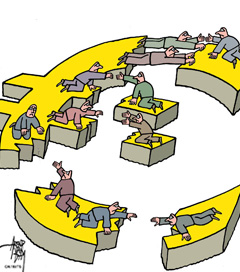Almost six years ago, the economist Nouriel Roubini wrote a commentary article for his EconoMonitor Web site describing how Giulio Tremonti, Italy’s economy minister, threw a hissy fit when Mr. Roubini suggested that Italy might have problems with its euro membership. And no, I’m not being unfair — read his piece.
In it, Mr. Roubini, who took part in a panel in 2006 in Davos, Switzerland, on the ups and downs of the European monetary union, wrote: “Unlike the other panelists that ignored the topic and spoke instead about all the good things allegedly associated with E.M.U., I took the questions seriously by considering some of the problems and risks faced by E.M.U. and the risks of a breakup, especially for the case of Italy. My remarks caused a stir with Minister Tremonti who interrupted me in the middle of my remarks, went into a temper tantrum and shouted — to the consternation of all participants — to me: ‘Go back to Turkey!’ ”
It was quite something.
What I would say is that this incident exemplified something that was going on all along the march to the eurodebacle. Serious discussion of the risks and possible downsides was simply not allowed. If you were an independent economist expressing even mild concerns about the project, you were labeled an enemy and shut out of the discussion.
In a way, the remarkable thing is that it took until now for disaster to strike.
It’s Not About Welfare States
Whenever a disaster happens, people rush to claim it as vindication for whatever they believed before. And so it is with the euro.
As an aside, the interesting thing about the introduction of the euro from a political point of view is the way it cut across the ideological spectrum. It was hailed by the Wall Street Journal crowd, who saw it as a sort of milestone on the way back to gold, and by many on the British left, who saw it as a way to create an alliance of social democracies. It was criticized by Thatcherites, who wanted to be free to move Britain in an American direction, and by American liberals, who believed in the importance of discretionary monetary and fiscal policy.
But now that the thing is in trouble, people on the right are spinning this as a demonstration that … strong welfare states can’t work.
So, just to say what should be obvious, the countries in trouble are not in any way marked out by having especially generous welfare states. You can use a number of indicators — such as the measure of “social expenditure” from the Organization for Economic Cooperation and Development, which measures (separately and together) both public spending and private spending that is channeled and regulated by public policy, like employer-based health insurance in the United States.
The data shows that Sweden, with the largest social expenditure, is doing just fine. So is Denmark. And Germany, which is the upside of the pulling-apart euro, has a bigger welfare state than the G.I.P.S. (Greece, Ireland, Portugal and Spain).
Not that the facts will convince anyone on the right, but the blame-the-welfare-state meme is nonsense.
Truthout has licensed this content. It may not be reproduced by any other source and is not covered by our Creative Commons license.
Paul Krugman joined The New York Times in 1999 as a columnist on the Op-Ed page and continues as a professor of economics and international affairs at Princeton University. He was awarded the Nobel in economic science in 2008.
Mr Krugman is the author or editor of 20 books and more than 200 papers in professional journals and edited volumes, including “The Return of Depression Economics” (2008) and “The Conscience of a Liberal” (2007). Copyright 2011 The New York Times.
Join us in defending the truth before it’s too late
The future of independent journalism is uncertain, and the consequences of losing it are too grave to ignore. To ensure Truthout remains safe, strong, and free, we need to raise $44,000 in the next 6 days. Every dollar raised goes directly toward the costs of producing news you can trust.
Please give what you can — because by supporting us with a tax-deductible donation, you’re not just preserving a source of news, you’re helping to safeguard what’s left of our democracy.
